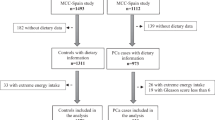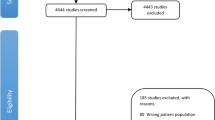Abstract
Prostate cancer (PCa) is the second most frequently diagnosed cancer and the sixth leading cause of death from cancer worldwide. Countries following a Mediterranean-type dietary pattern, has been reported to have lower PCa incidence and mortality compared with other European regions. A population-based case–control study has been conducted from January 2015 to December 2016 in a single institution of the municipality of Catania, southern Italy. A total of 118 PCa and 238 population-based controls were collected. Controls had significantly higher adherence to the Mediterranean diet, which was evident for several subgroups (including age groups, overweight and obese men, current smokers, alcohol intake, low and medium physical activity levels). PCa cases were found to consume lower amount of vegetables (223 g/d vs. 261 g/d; p = 0.001), legumes (34.26 g/d vs. 53.55 g/d; p = 0.003), and fish (47.75 g/d vs. 58.3 g/d) than controls; other differences emerged were related to alcohol intake (12.37 g/d vs 5.07 g/d; p < 0.01), cereals (254.06 g/d vs.235.94 g/d; p < 0.001), dairy (196 g/d vs. 166 g/d; p < 0.001), and meat consumption (98.09 g/d vs. 70.15 g/d; p < 0.001). However, no statistically significant differences between cases and controls were found regarding fruit, legumes, and olive oil consumption. The Mediterranean diet score was inversely associated with lower likelihood of having PCa in a linear manner (odds ratio [OR]: 0.86 [95% CI 0.77–0.96]). Specifically, individuals in the highest group of adherence had 78% less likelihood of have PCa and 14% less likelihood for each point increase of the score. The model adjusted for total polyphenol intake showed still a significant inverse association between adherence to the Mediterranean diet and PCa, but the relation was no more linear and not significant for one-point increase of the score (OR: 0.88 [95% CI 0.77–1.01]). In our cohorts of Italian men, we observed that high adherence to the Mediterranean diet was inversely associated with likelihood of having PCa cancer.
This is a preview of subscription content, access via your institution
Access options
Subscribe to this journal
Receive 8 print issues and online access
$259.00 per year
only $32.38 per issue
Buy this article
- Purchase on Springer Link
- Instant access to full article PDF
Prices may be subject to local taxes which are calculated during checkout
Similar content being viewed by others
References
Ferlay J, Shin HR, Bray F, Forman D, Mathers C, Parkin DM. Estimates of worldwide burden of cancer in 2008: GLOBOCAN 2008. Int J Cancer. 2010;127:2893–917.
Wilson KM, Giovannucci EL, Mucci LA. Lifestyle and dietary factors in the prevention of lethal prostate cancer. Asian J Androl. 2012;14:365–74.
Patel AR, Klein EA. Risk factors for prostate cancer. Nat Clin Pract Urol. 2009;6:87–95.
Zhang Q, Feng H, Qluwakemi B, Wang J, Yao S, Cheng G, et al. Phytoestrogens and risk of prostate cancer: an updated meta-analysis of epidemiologic studies. Int J Food Sci Nutr. 2017;68:28–42. Epub 2016 Aug
Wiseman M. The second World Cancer Research Fund/American Institute for Cancer Research expert report. Food, nutrition, physical activity, and the prevention of cancer: a global perspective. Proc Nutr Soc. 2008;67:253–6.
Vargas AJ, Neuhouser ML, George SM, Thomson CA, Ho GY, Rohan TE, et al. Diet quality and colorectal cancer risk in the Women’s Health Initiative Observational Study. Am J Epidemiol. 2016;184:23–32.
Esposito K, Ciotola M, Giugliano F, Schisano B, Autorino R, Iuliano S, et al. Mediterranean diet improves sexual function in women with the metabolic syndrome. Int J Impot Res. 2007;19:486–91.
Esposito K, Ciotola M, Marfella R, Di Tommaso D, Cobellis L, Giugliano D. The metabolic syndrome: a cause of sexual dysfunction in women. Int J Impot Res. 2005;17:224–6.
Khoo J, Ling PS, Tan J, Teo A, Ng HL, Chen RY, et al. Comparing the effects of meal replacements with reduced-fat diet on weight, sexual and endothelial function, testosterone and quality of life in obese Asian men. Int J Impot Res. 2014;26:61–66.
Godos J, Zappala G, Bernardini S, Giambini I, Bes-Rastrollo M, Martinez-Gonzalez M. Adherence to the Mediterranean diet is inversely associated with metabolic syndrome occurrence: a meta-analysis of observational studies. Int J Food Sci Nutr. 2017;68:138–48.
Grosso G, Marventano S, Yang J, Micek A, Pajak A, Scalfi L, et al. A comprehensive meta-analysis on evidence of Mediterranean diet and cardiovascular disease: are individual components equal? Crit Rev Food Sci Nutr. 2017;57:3218–32.
Schwingshackl L, Schwedhelm C, Galbete C, Hoffmann G. Adherence to Mediterranean diet and risk of cancer: an updated systematic review and meta-analysis. Nutrients. 2017;9. pii: E1063. https://doi.org/10.3390/nu9101063
Bray F, Lortet-Tieulent J, Ferlay J, Forman D, Auvinen A. Prostate cancer incidence and mortality trends in 37 European countries: an overview. Eur J Cancer. 2010;46:3040–52.
Richman EL, Carroll PR, Chan JM. Vegetable and fruit intake after diagnosis and risk of prostate cancer progression. Int J Cancer. 2012;131:201–10.
Craig CL, Marshall AL, Sjostrom M, Bauman AE, Booth ML, Ainsworth BE, et al. International physical activity questionnaire: 12-country reliability and validity. Med Sci Sports Exerc. 2003;35:1381–95.
Mistretta A, Marventano S, Platania A, Godos J, Galvano F, Grosso G. Metabolic profile of the Mediterranean healthy Eating, Lifestyle and Aging (MEAL) study cohort. Mediterr J Nutr Metab. 2017;10:131–40.
Marventano S, Mistretta A, Platania A, Galvano F, Grosso G. Reliability and relative validity of a food frequency questionnaire for Italian adults living in Sicily, Southern Italy. Int J Food Sci Nutr. 2016;67:857–64.
Buscemi S, Rosafio G, Vasto S, Massenti FM, Grosso G, Galvano F, et al. Validation of a food frequency questionnaire for use in Italian adults living in Sicily. Int J Food Sci Nutr. 2015;66:426–38.
Istituto Nazionale di Ricerca per gli Alimenti e la Nutrizione. Tabelle di composizione degli alimenti. 2009.
Godos J, Marventano S, Mistretta A, Galvano F, Grosso G. Dietary sources of polyphenols in the Mediterranean healthy eating, aging and lifestyle (MEAL) study cohort. Int J Food Sci Nutr. 2017;68:750–6.
Sofi F, Dinu M, Pagliai G, Marcucci R, Casini A. Validation of a literature-based adherence score to Mediterranean diet: the MEDI-LITE score. Int J Food Sci Nutr. 2017;68:757–62.
Grosso G, Bella F, Godos J, Sciacca S, Del Rio D, Ray S, et al. Possible role of diet in cancer: systematic review and multiple meta-analyses of dietary patterns, lifestyle factors, and cancer risk. Nutr Rev. 2017;75:405–19.
Trichopoulou A, Lagiou P, Kuper H, Trichopoulos D. Cancer and Mediterranean dietary traditions. Cancer Epidemiol Biomark Prev. 2000;9:869–73.
Kenfield SA, DuPre N, Richman EL, Stampfer MJ, Chan JM, Giovannucci EL. Mediterranean diet and prostate cancer risk and mortality in the Health Professionals Follow-up Study. Eur Urol. 2014;65:887–94.
Castello A, Boldo E, Amiano P, Castano-Vinyals G, Aragones N, Gomez-Acebo, et al. Mediterranean dietary pattern is associated to low risk of aggressive prostate cancer: MCC-Spain Study. J Urol. 2017;199:430–7.
Grosso G, Micek A, Godos J, Pajak A, Sciacca S, Galvano F, et al. Dietary flavonoid and lignan intake and mortality in prospective cohort studies: systematic review and dose-response meta-analysis. Am J Epidemiol. 2017;185:1304–16.
Grosso G, Godos J, Lamuela-Raventos R, Ray S, Micek A, Pajak A, et al. A comprehensive meta-analysis on dietary flavonoid and lignan intake and cancer risk: level of evidence and limitations. Mol Nutr Food Res. 2017;61. https://doi.org/10.1002/mnfr.201600930
Capurso C, Vendemiale G. The Mediterranean diet reduces the risk and mortality of the prostate cancer: a narrative review. Front Nutr. 2017;4:38.
Morgia G, Cimino S, Favilla V, Russo GI, Squadrito F, Mucciardi G, et al. Effects of Serenoa repens, selenium and lycopene (Profluss(R)) on chronic inflammation associated with benign prostatic hyperplasia: results of “FLOG” (Flogosis and Profluss in Prostatic and Genital Disease), a multicentre Italian study. Int Braz J Urol. 2013;39:214–21.
Godos J, Rapisarda G, Marventano S, Galvano F, Mistretta A, Grosso G. Association between polyphenol intake and adherence to the Mediterranean diet in Sicily, southern Italy. NFS J. 2017;8:1–7.
Russo GI, Campisi D, Di Mauro M, Regis F, Reale G, Marranzano M, et al. Dietary consumption of phenolic acids and prostate cancer: a case-control study in Sicily, southern Italy. Molecules. 2017;22. pii: E2159. https://doi.org/10.3390/molecules22122159
Russo GI, Di Mauro M, Regis F, Reale G, Campisi D, Marranzano M et al. Association between dietary phytoestrogens intakes and prostate cancer risk in Sicily. Aging Male 2017;1–7.
Reale G, Russo GI, Di Mauro M, Regis F, Campisi D, Giudice AL, et al. Association between dietary flavonoids intake and prostate cancer risk: a case–control study in Sicily. Complement Ther Med. 2018;39:14–18.
Aune D, Navarro Rosenblatt DA, Chan DS, Vieira AR, Vieira R, Greenwood DC, et al. Dairy products, calcium, and prostate cancer risk: a systematic review and meta-analysis of cohort studies. Am J Clin Nutr. 2015;101:87–117.
Harrison S, Lennon R, Holly J, Higgins JPT, Gardner M, Perks C, et al. Does milk intake promote prostate cancer initiation or progression via effects on insulin-like growth factors (IGFs)? A systematic review and meta-analysis. Cancer Causes Control. 2017;28:497–528.
Godos J, Bella F, Sciacca S, Galvano F, Grosso G. Vegetarianism and breast, colorectal and prostate cancer risk: an overview and meta-analysis of cohort studies. J Hum Nutr Diet. 2017;30:349–59.
Wu K, Spiegelman D, Hou T, Albanes D, Allen NE, Berndt SI, et al. Associations between unprocessed red and processed meat, poultry, seafood and egg intake and the risk of prostate cancer: a pooled analysis of 15 prospective cohort studies. Int J Cancer. 2016;138:2368–82.
Grosso G, Micek A, Godos J, Pajak A, Sciacca S, Galvano F, et al. Health risk factors associated with meat, fruit and vegetable consumption in cohort studies: a comprehensive meta-analysis. PLoS ONE. 2017;12:e0183787.
Li YC, Jiang B, Zhang M, Huang ZJ, Deng Q, Zhou MG, et al. Vegetable and fruit consumption among Chinese adults and associated factors: a nationally representative study of 170,847 adults. Biomed Environ Sci. 2017;30:863–74.
Lenighan YM, Nugent AP, Li KF, Brennan L, Walton J, Flynn A, et al. Processed red meat contribution to dietary patterns and the associated cardio-metabolic outcomes. Br J Nutr. 2017;118:222–8.
Pearson-Stuttard J, Zhou B, Kontis V, Bentham J, Gunter MJ, Ezzati M. Worldwide burden of cancer attributable to diabetes and high body-mass index: a comparative risk assessment. Lancet Diabetes Endocrinol. 2017;6:95–104.
Grosso G, Buscemi S, Galvano F, Mistretta A, Marventano S, La Vela V, et al. Mediterranean diet and cancer: epidemiological evidence and mechanism of selected aspects. BMC Surg. 2013;13(Suppl 2):S14.
La Verde M, Mule S, Zappala G, Privitera G, Maugeri G, Pecora F, et al. Higher adherence to the Mediterranean diet is inversely associated with having hypertension: is low salt intake a mediating factor? Int J Food Sci Nutr. 2018;69:235–44.
Platania A, Zappala G, Mirabella MU, Gullo C, Mellini G, Beneventano G, et al. Association between Mediterranean diet adherence and dyslipidaemia in a cohort of adults living in the Mediterranean area. Int J Food Sci Nutr. 2018;69:608–18.
Zappala G, Buscemi S, Mule S, La Verde M, D’Urso M, Corleo D, et al. High adherence to Mediterranean diet, but not individual foods or nutrients, is associated with lower likelihood of being obese in a Mediterranean cohort. Eat Weight Disord. 2017;23:605–14.
Marventano S, Godos J, Platania A, Galvano F, Mistretta A, Grosso G. Mediterranean diet adherence in the Mediterranean healthy eating, aging and lifestyle (MEAL) study cohort. Int J Food Sci Nutr. 2018;69:100–7.
Author information
Authors and Affiliations
Corresponding author
Ethics declarations
Conflict of interest
The authors declare that they have no conflict of interest.
Rights and permissions
About this article
Cite this article
Russo, G.I., Solinas, T., Urzì, D. et al. Adherence to Mediterranean diet and prostate cancer risk in Sicily: population-based case–control study. Int J Impot Res 31, 269–275 (2019). https://doi.org/10.1038/s41443-018-0088-5
Received:
Revised:
Accepted:
Published:
Issue Date:
DOI: https://doi.org/10.1038/s41443-018-0088-5
This article is cited by
-
An updated systematic review and meta-analysis on adherence to mediterranean diet and risk of cancer
European Journal of Nutrition (2021)



